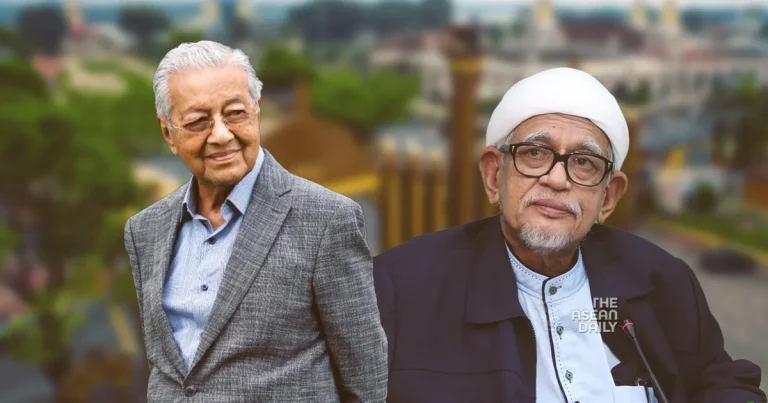25-9-2023 (KUALA LUMPUR) Dr. Mahathir Mohamad, the former Prime Minister of Malaysia, has been appointed as an “unofficial advisor” to four Malay-Muslim-majority states led by Parti Islam Se-Malaysia (PAS): Kedah, Perlis, Kelantan, and Terengganu. This development marks a significant political reconciliation, given the frosty history of relations between Mahathir and PAS during his various tenures as Malaysia’s Prime Minister.
Dr. Mahathir’s political career came to an official end following the November 2022 general election (GE15). He lost his Langkawi parliamentary seat, forfeited his election deposit, and subsequently resigned from his party, Pejuang. After this humbling defeat, he initially announced his intention to focus on writing about Malaysia’s history and opted to engage with international platforms rather than participate in domestic politics.
However, his reentry into the domestic political scene was triggered by a controversial remark from Prime Minister Anwar Ibrahim during the Parti Keadilan Rakyat (PKR) convention. Although Anwar did not explicitly mention Mahathir’s name, he insinuated that Mahathir had been involved in financial improprieties during his 22-year tenure. Mahathir responded by suing Anwar.
This incident motivated Mahathir to speak more assertively about protecting Malay rights, bringing him closer to the Perikatan Nasional (PN) coalition, of which PAS is a member. In the recent state elections, which included contests in Kelantan, Terengganu, Kedah, Selangor, Penang, and Negeri Sembilan, Mahathir actively campaigned for PN, despite not being a member of the coalition.
It’s important to note that Mahathir’s view of PAS has evolved over time. In the 1980s and 1990s, he considered PAS a “backward” political party and strongly disapproved of its advocacy for an Islamic state and a shariah criminal code, which included severe punishments like amputation, stoning, and the death penalty. During this period, Mahathir and the government led by the United Malays National Organisation (UMNO) actively opposed PAS’s agenda.
A key point of contention revolved around PAS’s declaration of UMNO leaders as “kafir” (deviant), which is not aligned with Islamic principles. Additionally, PAS lent support to Abdul Hadi Awang’s infamous Amanat Haji Hadi (Abdul Hadi’s Message) in 1981, wherein PAS leaders declared their struggle as a “jihad” (holy war) and criticized UMNO for upholding a colonial Constitution, laws of unbelievers, and pre-Islamic legislation. These differences in perspective further strained their relationship.
As recently as 2019, Mahathir urged PAS to withdraw from Amanat Haji Hadi, highlighting the lingering tensions between the two.
In a surprising turn of events, Mahathir and Abdul Hadi, along with PAS, have now seemingly reconciled for political reasons. This reconciliation is strategic and serves mutual interests. On one hand, Mahathir aims to rekindle his statesman image, especially given his significant contributions to Malaysia’s industrialization and transformation into an Asian Tiger economy during the 1990s. He does not want to be remembered as a political has-been, and, at the age of 97, continues to command respect on international platforms, particularly in Japan and South Korea.
However, his standing in domestic politics has diminished significantly. In light of PAS’s strong electoral performance in recent general and state elections, Mahathir now seeks to align himself with the winning side, erasing the memories of his 2022 electoral defeat. This realignment serves his political rejuvenation.
On the other hand, PAS aims to leverage Mahathir’s stature to alter its image. The current crop of PAS chief ministers differs from their ulama (religious scholars) predecessors, such as Nik Aziz, Fadzil Noor, and Abdul Hadi Awang. The current leaders are professionals, former civil servants, and businessmen, with a diverse range of experiences. For example, Muhammad Sanusi Md Nor, the Chief Minister of Kedah, has a military background, while Dr. Ahmad Samsuri, the Chief Minister of Terengganu, was an aerospace engineer.
This new generation of leaders seeks to harness Mahathir’s experience to drive economic growth, attract investments to the four PAS-led states, and enhance governance. Dr. Ahmad Samsuri has even mentioned that Mahathir could facilitate connections with Japanese and South Korean investors and offer valuable advice on effective governance.
While the alliance between Mahathir and PAS may be strategically motivated, it raises several important considerations. Firstly, Mahathir’s involvement is unlikely to offer quick solutions for the development of the four PAS-led states. Given their current stage of development, particularly in states like Kelantan and Perlis, the development process will be long-term.
Furthermore, there is a need to reconcile two divergent concepts that have historically contributed to tensions between Mahathir and PAS: Mahathir’s nationalist capitalism and PAS’s Islamic-based development model. Mahathir’s economic vision focuses on achieving economic parity between Malays and non-Malays through the promotion of a Malay capitalist class. In contrast, PAS’s approach remains conceptually elusive, with occasional mentions of welfarism.
To broaden its appeal and make inroads into more urbanized and multi-ethnic parts of Malaysia, PAS may find limited utility in Mahathir’s involvement. Mahathir has become associated with a more exclusivist Malay-Islamic rights discourse, which may not align with PAS’s efforts to reshape its image and gain wider support.
PAS will require more than just Mahathir’s advisory role if it is genuinely committed to winning the hearts and minds of the broader Malaysian society, moving beyond its traditional strongholds of influence.




